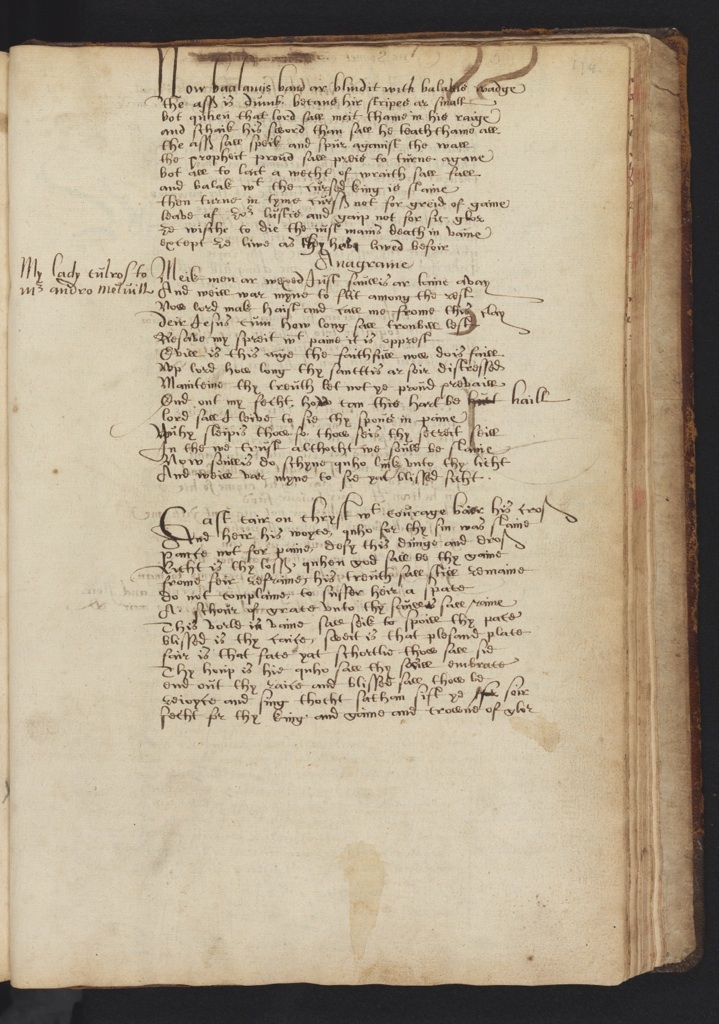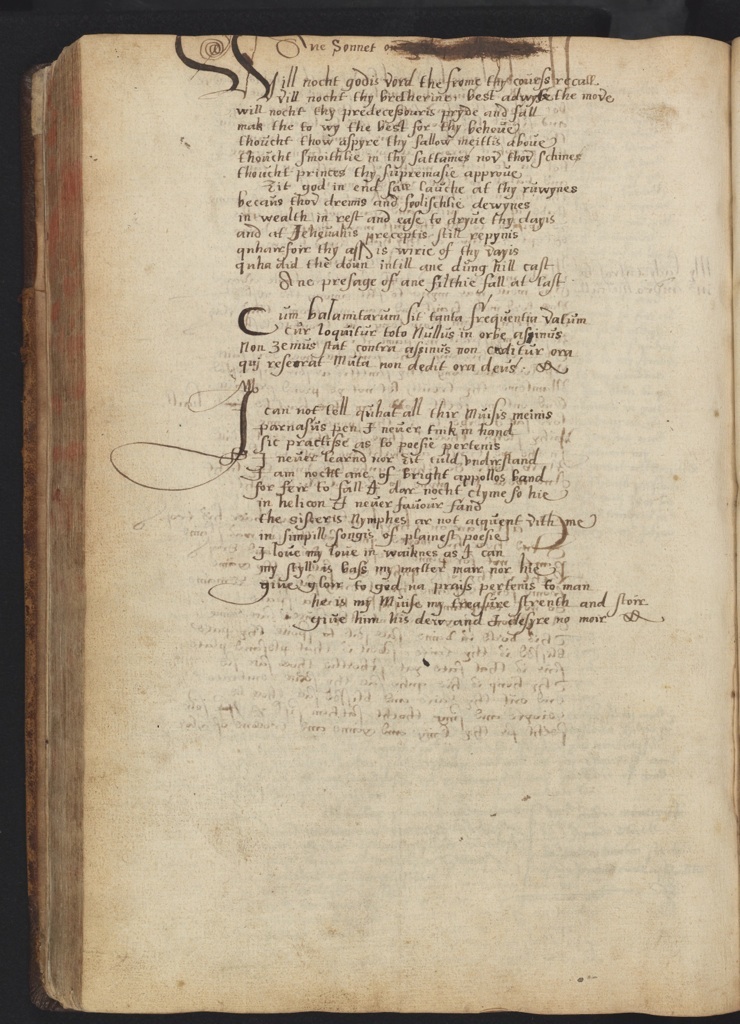| Images | Transcription | ||
|---|---|---|---|
|
1. Now baalamis band ar blindit with balakis wadge* the ass is dumb becaus hir stripes ar small bot quhen that lord sall meit thame in his raige and schaik his sword than sall he teach thame all the ass sall speik and spur against the wall the propheit proud sall preis* to turne agane bot all to[o] lait a wecht* of wraith sall fall and balak wt the cursed king is slaine then turne in tyme curss not for greid of gaine leave af yor lustis* and gaip not for sic glor Ye wishe to die the iust manis death in vaine except ye live as thy hev* lived befoir
Balaam the biblical prophet who ‘loved the wages of unrighteousness’, and his band are here a figures for the Scottish bishops. See 2 Peter 2:15; Numbers 22; Revelation 2:14. wadge pledge, payment preis beset or harass wecht weight lustis lusts, pleasures or enjoyments hev have
2.
Anagrame And weill war myne is a loose anagram of Andrew Mellwyn; the poem also incorporates an acrostic on the same name, M ANDREW MELVIN. meik meek; wexed afflicted flit to leave or move Resave Receive sancttis saints fecht fight Vuhy adjusted by the scribe from Quhy (Why), to serve the purposes of the acrostic seill prosperity schyne shine
3. Cast cair on chryst wt courage bair his cross And heir his woyce, quho* for thy sin was slaine pance* not for paine, defy this dunge and dross Licht is thy loss, quhen god sall be thy gaine frome feir refraine, his treuth sall still remaine do not complaine, to suffer heir a space A schour* of grace vnto thy saullis sall raine This vorld in vaine sall seik to spoill thy pace* blissed is thy caice*, sweit is that plesand place fair is that face yat schortlie thow sall sie Thy howp* is hie quho sall thy soull embrace end out thy raice and blissed sall thow be reioyce and sing thocht sathan sift ye sor soir fecht for thy king and gaine ane crowne of glor
quho who pance consider, ponder schour shower pace peace caice case howp hope
|
|||
|
4. Ane Sonnet on [illegible text crossed out]
Vill nocht godis vord the[e] frome thy courss recall. vill nocht thy bretherine, best adwyse the[e] move will nocht thy predecessouris pryde and fall mak the[e] to wy the best for thy behoue thoucht thow aspyre thy fallow meittis aboue thoucht smoithlie in thy sattaines nov thov schines thoucht princes thy supremasie approue Yit god in end sall lauche at thy ruwynes becaus thov dreims and foolischlie dewynes in wealth in rest and ease to dryue thy dayis and at Jeheuahis preceptis still repynis quahirfoir thy ass is wirie of thy vayis quha did the[e] doun intill ane dung hill cast Ane presage of ane filthie fall at last.
Ane Sonnet on The name of the subject and addressee of this bitterly political sonnet has been deliberately blacked out.
5. Cum balamitarum sic tanta frequentia valum cur loquitur toto Nullus in orbe assinus Non yemus stat contra assinus non creditur ora quj reserrat Muta non dedit ora deus
For a translation, see the Textual Introduction.
6. M I can not tell quhat all thir Muisis meinis parnasus pen I neuer tuik in hand sic practisse as to poesie pertenis I neuer learnd nor yit culd vndirstand I am nocht ane of bright appollos band for feir to fall I dar nocht clyme so hie in helicon I neuer fauour fand the sisteris Nymphes ar not acquent vith me in simpill songis of plainest poesie I loue my loue in waiknes as I can my styll is bass my matter mair nor hie giue glore to god na praiss pertenis to man he is my Muise my treasure strenth and stoir giue him his dew and I desyre no moir [?R] |


